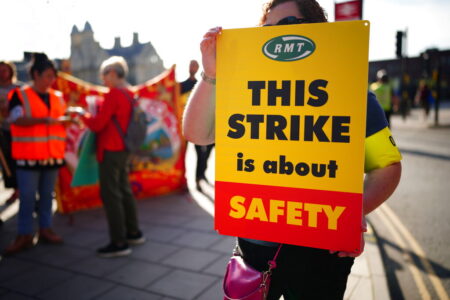The largest rail strike in 30 years is currently taking place in Britain. On Tuesday, June 21, hundreds of train workers staged a nationwide strike in opposition to anticipated job losses, wage freezes, and shifting working conditions.

After last-minute negotiations with train operating firms fell down on June 20, more than 40,000 railway employees of the National Union of Rail, Maritime, and Transport Workers (RMT) went on strike, which will continue on June 23 and 25 as well.
The railway strike, which other unions have also vowed to undertake, may signal the start of the UK’s “summer of discontent” due to spiking inflation and rising costs of living.
With more than 80,000 members, including guards, construction workers, caterers, and cleaners, the RMT is one of the major transport trade unions in Britain. It was founded in 1990.
The National Rail, a public sector organisation that owns, runs, and administers the infrastructure of the bulk of Britain’s railway networks, is the target of the group’s protests. The RMT union’s members unanimously decided to go on strike on May 24 in protest of ongoing wage and potential job reduction conflicts.
Consumer prices increased by 9% in April 2022, the greatest rate of inflation the UK has seen in the last 40 years. According to The Wall Street Journal, the Bank of England cautioned that due to rising energy prices, it may rise by more than 11% later in the year.
RMT employees assert that for the past two to three years, their incomes have not grown despite the economic downturn. They want rises of at least 7% in order to keep up with the growing expense of living. According to the union, Network Rail’s offer of a 2 percent raise with an additional 1 percent potential is “unacceptable,” as reported by the BBC.
The National Rail’s projected modernization plan is another contentious issue. The RMT claims that in order to save £2 billion over the following several years, this would need an increase in working hours and the elimination of about 2,500 maintenance positions. According to the RMT, these positions are essential to upholding the railroads’ safety standards.
Government representatives claim that the claim that the budget has been slashed by £2 billion is false. They claim that instead, during the coronavirus epidemic, the trains were supported with £16 billion in government money, according to the BBC.
Additionally, the government has maintained that the modifications are necessary since train revenues have sharply decreased – current passenger numbers are about a sixth of pre-pandemic levels. The way people travel has evolved, and in order to adapt to this new reality, the railroad must alter as well, according to Network Rail CEO Andrew Haines on May 25.
Only around 20% of passenger trains were planned for Tuesday, which affected millions of commuters. Media sources said that a separate strike by London Underground employees caused more difficulty for commuters.
Although there were no strikes on Wednesday, barely 60% of the trains were expected to operate owing to the ongoing consequences of the disruption. The Network Rail, the train companies, and the protesting RMT members spoke.
The strikes, said to Prime Minister Boris Johnson, were “wrong and unwarranted” and will further harm firms trying to recover from Covid-19 problems. According to a projection by the consultancy The Centre for Economics and Business Research, the economy would lose almost £91 million over the course of three strike days (June 21, 23, and 25).











